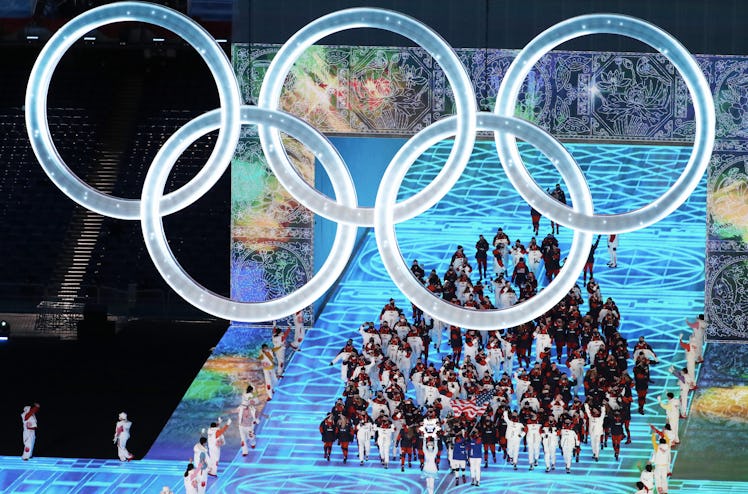
The Winter Olympics Have Some Big Changes To Mental Health Policy After 2021
Officials say they’ve learned some lessons since the 2021 Summer Games.
Priorities are shifting at the 2022 Winter Olympics in Beijing. In the aftermath of Simone Biles’ withdrawal from a number of gymnastics events at the 2021 Summer Olympics in Tokyo to prioritize her mental health, Team USA announced new mental health practices to support the athletes competing at the 2022 Winter Games. Here’s a rundown of all the new mental health resources for Team USA at the 2022 Winter Olympics.
In a virtual Team USA media summit held in October 2021, mental health was a recurring theme. In one panel, Chief of Athlete Services for the United States Olympic & Paralympic Committee (USOPC) Bahati VanPelt shared some of the new mental health initiatives the USOPC will implement in Beijing, including the creation of more wellness spaces to make mental health officers and the USOPC clinical team available to athletes, more “domestic engagement with friends and family during the games,” and creating opportunities to honor individual career achievements. According to VanPelt, the USOPC decided to implement these changes “based on the lessons we learned” from the 2020 Summer Games.
At the same media summit, USOPC Director of Mental Health Services Jessica Bartley announced that the USOPC will provide several forms of in-person and virtual help to its athletes, including individual and group therapy, a 24/7 mental health hotline, and assistance with “transition out of sport.”
Bartley also shared that the USOPC has been conducting a series of mental health screens on each athlete to get a better “baseline on where athletes are at” and monitor any changes in anxiety, depression, and other mental health conditions.
Another resource new to the 2022 Winter Games is a mental health emergency action plan, which Bartley’s team and sports psychologists spent a year working to create.
Other mental health resources mentioned in the media summit include the presence of sports psychologists in the villages and venues, and a program called E-Home that allows athletes to video chat with a mental health professional at any time of day. There will also be one on-site therapist in each of the Olympic Villages who will be available to all of Team USA’s athletes, staff, and family members.
Though Bartley claims the additional mental health practices weren’t influenced by a particular individual, there’s no doubt the conversations surrounding the 2021 Summer Games created a demand for more mental health resources.
In addition to Team USA-focused initiatives, the International Olympic Committee (IOC) also offers a mental health support kit and hotline to competing athletes from all countries. According to an October 2021 post on the Olympics website, the IOC Mental Health in Elite Athletes Toolkit provides Olympians with an overview of common mental health symptoms and disorders, as well as additional resources for more help and information. The Mentally Fit Hotline offers 24-hour support for athletes struggling with their mental wellbeing, and athletes competing in the Beijing Games are eligible to receive six free counseling sessions for up to three months post-Olympics.
While the pressure of competition is definitely real, hopefully these resources will help the competing athletes from feeling it too harshly. Instead, they can focus on the best part of sports — actually playing them!